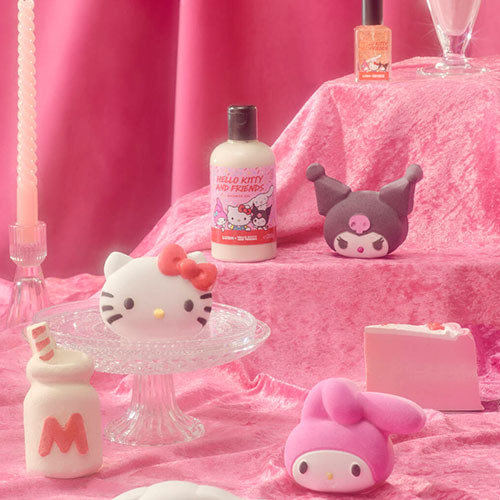Start Licensing’s Ian Downes heads back to Birmingham, this time for the CHSI Stitches show and discovers how licensing can help retailers in the crafting sector.
One change I have noticed over the years I have worked in licensing is that there has been a gradual shift in the market in terms of product and retail sectors making use of licensing. This is coupled with a shift in the spread of rights seen in the market.
Licensing used to be concentrated in retailers like Woolworths with rights drawn from a narrow pool. This is no longer the case, but that said there is still little room for complacency in regards to the need for the industry to keep pushing itself into new markets.
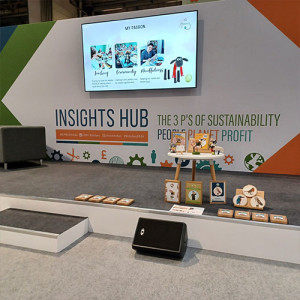 Personally, I feel we all have a role to play in growing the licensing sector. I think I did my bit on Sunday by joining licensee Steffi Stern at the CHSI Stitches trade show at the NEC to talk about how stocking licensed kits could help retailers in the crafting sector and how they can make the most of the opportunity.
Personally, I feel we all have a role to play in growing the licensing sector. I think I did my bit on Sunday by joining licensee Steffi Stern at the CHSI Stitches trade show at the NEC to talk about how stocking licensed kits could help retailers in the crafting sector and how they can make the most of the opportunity.
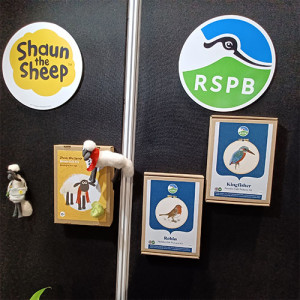 Steffi’s company has embraced licensing and has developed a number of needle-felting kits under licence using brands such as Me to You, RSPB, Shaun the Sheep, Robin Robin and Percy the Park Keeper. Steffi is a great ambassador for her craft and, in turn, has become a passionate advocate for the benefits of licensing. Hopefully our presentation helped in the mission of selling the benefits of licensing. I did have some good chats with people after the presentation, albeit mostly with designers about how they could licence their creations, but it was good to get some engagement around licensing. While crafting isn’t an entirely new market to me, it is a good example of a category that should be receptive to licensing.
Steffi’s company has embraced licensing and has developed a number of needle-felting kits under licence using brands such as Me to You, RSPB, Shaun the Sheep, Robin Robin and Percy the Park Keeper. Steffi is a great ambassador for her craft and, in turn, has become a passionate advocate for the benefits of licensing. Hopefully our presentation helped in the mission of selling the benefits of licensing. I did have some good chats with people after the presentation, albeit mostly with designers about how they could licence their creations, but it was good to get some engagement around licensing. While crafting isn’t an entirely new market to me, it is a good example of a category that should be receptive to licensing.
Indeed beyond The Makerss there were a few other examples of licensing on show at the Stitches Show. The Crafty Kit Company featured Peter Rabbit, Moomins and a recently launched Miffy kit range. It seems to be a company that has enjoyed success with licensing in its category and has grown more confident about using licensing. A key for companies like it and The Makerss is to ensure they develop kits that represent the brands they use well, while creating kits that strike a chord with consumers in regards to the kits suitability for the craft. Consumer targeting and deciding which level to pitch kits at is a challenge in the category. It is also worth reflecting on the fact that rights holders and agents need to approach the category in a responsible fashion with a view to nurturing it rather than seeing it as an opportunity for quick wins. Licensing has to build its reputation in the category and show that it can be a positive force in the category.
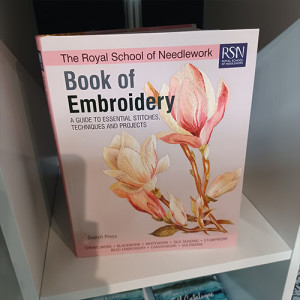 It was also good to see specialist publisher Search Press at the show. It has a variety of licensed products in its portfolio including tie-in books with brands such as Kew and the Royal School of Needlework. It has developed a range of books with Aardman including a recently launched Chicken Run title. It also distributes titles from David & Charles which include the likes of Pokémon crafting books. This is a reminder that licensing can help businesses like Search reach new audiences and specifically younger audiences.
It was also good to see specialist publisher Search Press at the show. It has a variety of licensed products in its portfolio including tie-in books with brands such as Kew and the Royal School of Needlework. It has developed a range of books with Aardman including a recently launched Chicken Run title. It also distributes titles from David & Charles which include the likes of Pokémon crafting books. This is a reminder that licensing can help businesses like Search reach new audiences and specifically younger audiences.
Artist and illustrator Emma Ball had a stand at the show featuring her product ranges, but also products featuring art from other artists. This is a good example of an art-focused company taking a proactive approach to retail engagement and using a trade show as part of their marketing efforts. A trade show like Stitches is a great way of showcasing a brand while having the benefit of meeting retailers in person, taking orders and getting feedback on your products.
Reflecting on my earlier point about Woolworths and how licensing was concentrated in a few retail channels, it has been encouraging to see a wider pool of retailers featuring licensing over recent years. It certainly seems to be on the retail radar these days.
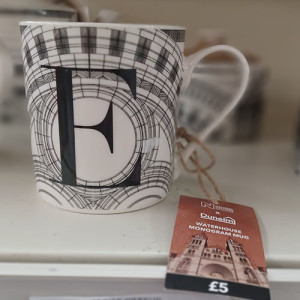 A great example of this is how the retailer Dunelm uses licensing in its stores. I visited one of the shops at the weekend. The branch I visited was on a retail park and it was a shed style outlet set over two floors. It also had a café on site so had the feeling of a destination store.
A great example of this is how the retailer Dunelm uses licensing in its stores. I visited one of the shops at the weekend. The branch I visited was on a retail park and it was a shed style outlet set over two floors. It also had a café on site so had the feeling of a destination store.
Seemingly Dunelm had at least two direct to retail style licensed ranges. One featured the Natural History Museum and was positioned on an end cap. The range included a variety of products including a nice range of gift lines such as mugs which featured letters of the alphabet using a custom font. Other products in the range included tea towels and aprons.
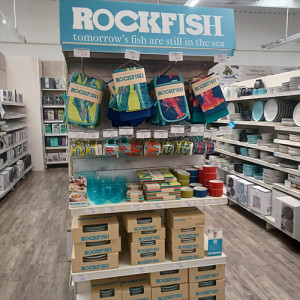 Another brand I spotted in store which I assumed was a Dunelm own brand range was a kitchenwares range featuring the restaurant brand Rockfish. The range was bright, colourful and contemporary in styling terms. It was featured on an end cap. Products in the range included mugs, kitchen textiles and tableware. The range worked well together and I imagine it appealed to younger consumers in particular because of its colourways.
Another brand I spotted in store which I assumed was a Dunelm own brand range was a kitchenwares range featuring the restaurant brand Rockfish. The range was bright, colourful and contemporary in styling terms. It was featured on an end cap. Products in the range included mugs, kitchen textiles and tableware. The range worked well together and I imagine it appealed to younger consumers in particular because of its colourways.
Beyond these two brands it seemed like Dunelm works with a range of licensed suppliers to top up its licensing offer. A predominate brand was Disney with a mix of classic Disney characters, Marvel and Star Wars. Another reminder of the power of a portfolio. Featured products included bedding, home furnishings, wall stickers and more specialist items like luggage. One interesting item was a cushion that used the iconic silhouette of Mickey Mouse – a measure of Mickey’s popularity but also a clever example of design in a category that can be quite staid.
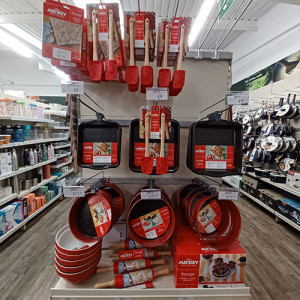 Mickey Mouse also featured prominently in the cookware department with Dunelm giving a lot of space to Meyer’s Mickey Mouse kitchenware. The range was launched to coincide with Disney’s 100th anniversary campaign. Rather like the Rockfish range, these products benefit from a contemporary design approach using bright colourways and clever use of shapes including Mickey’s silhouette again. Cookware, kitchenware and bakeware are categories where it is a challenge to do something different and to appeal to new consumers – licensing can help in this context, particularly with a fresh approach to design. That said product still has to deliver in terms of form and function. That’s where it is good to see experienced companies like Meyer come into the licensed space as they can bring their category expertise to bear in product development terms.
Mickey Mouse also featured prominently in the cookware department with Dunelm giving a lot of space to Meyer’s Mickey Mouse kitchenware. The range was launched to coincide with Disney’s 100th anniversary campaign. Rather like the Rockfish range, these products benefit from a contemporary design approach using bright colourways and clever use of shapes including Mickey’s silhouette again. Cookware, kitchenware and bakeware are categories where it is a challenge to do something different and to appeal to new consumers – licensing can help in this context, particularly with a fresh approach to design. That said product still has to deliver in terms of form and function. That’s where it is good to see experienced companies like Meyer come into the licensed space as they can bring their category expertise to bear in product development terms.
Other branded ranges on show in this category included chef Ken Hom’s Wok range. Dunelm also sells books alongside the kitchenware products tying in book themes to specific cookware ranges – hence it stocking One Wok One Pot by Kwoklyn Wan alongside Ken’s woks. It also sells children’s books and within this offering there were licensed titles such as Peppa Pig. Other product categories in-store included greeting cards, stationery and lunchware.
Dunelm is a value orientated retailer – my visit suggested it is a popular destination with a lot of shoppers in-store and shoppers who were actually buying not browsing. In this context I think there is a challenge for Dunelm in terms of keeping the shelves filled, having stock in-store and maintaining displays. Licensed products work best I think when the licensed brand is used to group or lead a display. Maybe there is an educational piece that licensing can deliver around in-store displays and how licensed brands can help retailers create impact in store. Overall it was good to see how Dunelm has embraced licensing and that it seems to be a licensing convert.
Thinking about new ways and channels for selling licensed products, it is always interesting to see how direct marketing companies are using licensing. These companies know their customers and reach them efficiently either through their own databases or via direct response advertising. In the age of fan driven licensing programmes, selling via direct means it becomes even more of an opportunity I think. It is an efficient way of reaching fans.
Bagpuss is celebrating his 50th anniversary this year. In response to this Steiff has created a 50th anniversary Bagpuss which I spotted being sold off the page in the Metro by mail order specialist Danbury Mint, while I also saw Westminster Collection selling a collection of four Star Wars 50 pence coins. These were again being sold off the page and offered in a bespoke folder. Companies like Danbury Mint and the Westminster Collection recognise the value of licensing to their business and as noted offer an alternative way to reach consumers especially fans. Indeed they are arguably able to help some IP owners unlock the potential of their brand by delivering audiences in an efficient way via their databases.
Ian Downes runs Start Licensing, an independent brand licensing agency. His Twitter handle is @startlicensing – he would welcome your suggestions for what to look out for.



























